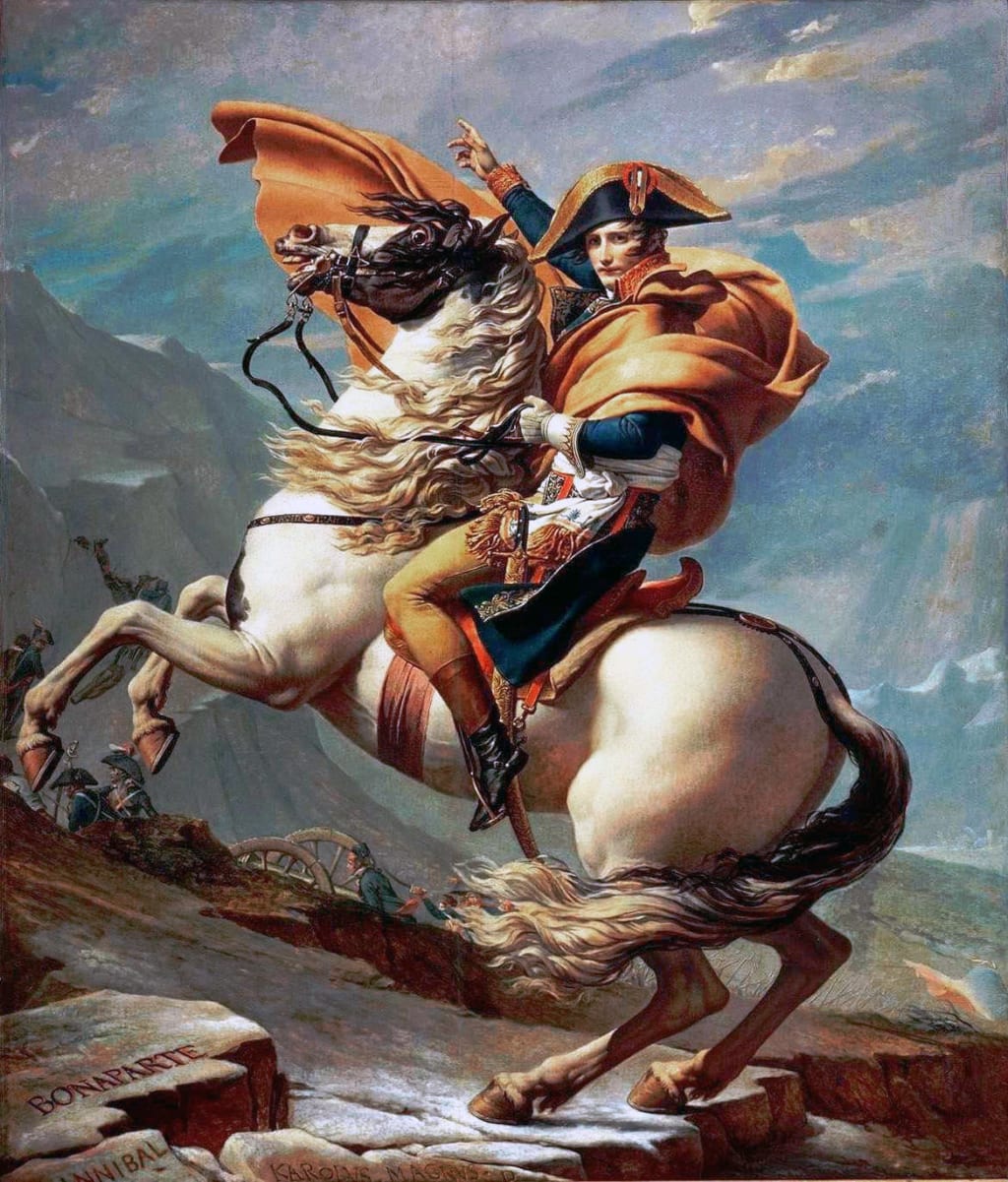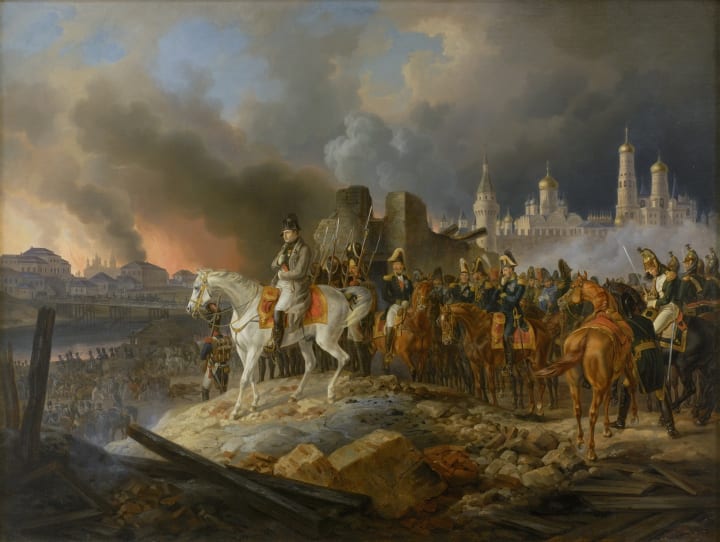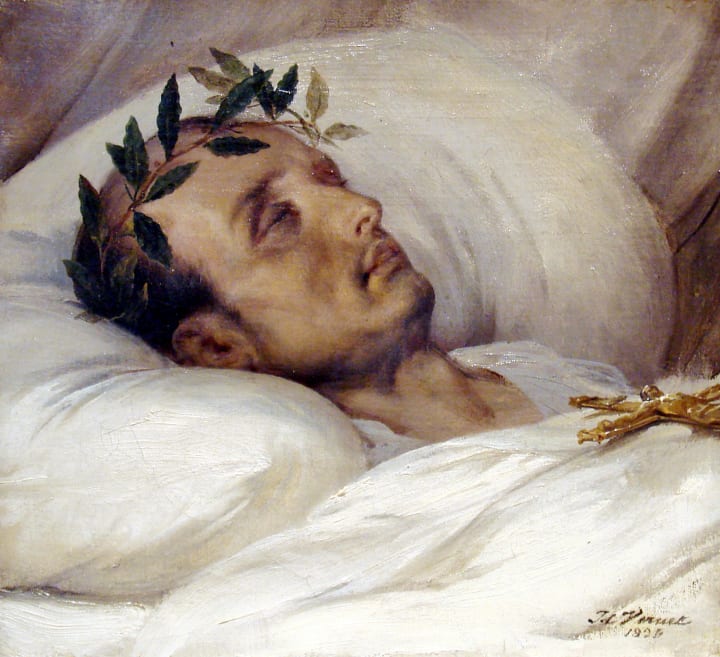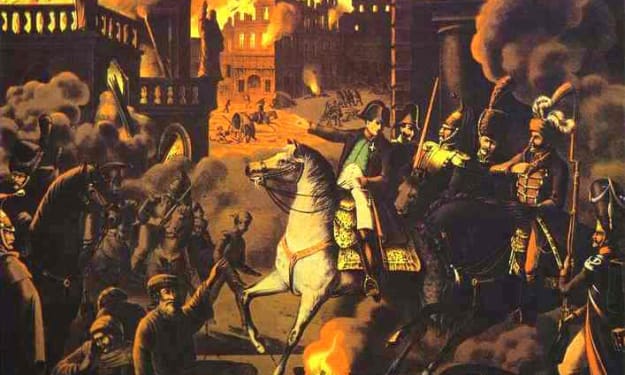Was Napoleon Bonaparte Really All That Bad?
Maybe it's about time we started to celebrate the Little General and his accomplishments

When people begin listing off mad, tyrannical rulers, it doesn’t get too deep before the name Napoleon Bonaparte comes up. Ask someone to use two words to describe the man and ‘petty tyrant’ are amongst the kindest. Some historians genuinely consider Bonaparte to be a maniac only topped by Hitler in the misery they wrought during their lifetime.
But is that fair? Well, history is subjective, but I’d argue it is not.
A virtual ‘rags to riches’ story, Napoleon was born on the small island of Corsica, only recently ceded to the French Empire at the time, and from an early age he showed promise and moved to the French mainland to pursue a military education and career. From there, using military talent, his burgeoning intellect, and seizing every opportunity that came his way, he climbed the ranks to General at the age of just 24.
As the French Revolution erupted, suddenly a man of his background and status was allowed to excel and progress without limits, which he did so with a military mind unseen in the modern world, winning battle after battle in Italy to hone an excellent reputation for himself back home.
“[The Napoleonic Code is] the greatest codification of laws since the fall of the Roman Empire” — Andrew Roberts
And this is how Napoleon came to power. Not through revolution in 1789 (he was a mere officer when that happened), but through grabbing the opportunity created through circumstance, his own talent and his popularity. In power, he reformed the education system, revolutionised modern warfare, and created the Napoleonic Code: a set of civil laws still largely used to this day and described by historian Andrew Roberts as “the greatest codification of laws since the fall of the Roman Empire”.
Such a story as this should be celebrated. Was Napoleon without his flaws? Absolutely not, as we will see, but we unflinchingly celebrate far more questionable characters from our history, so why not Napoleon too?
Well, as they say, history is written by the victors, and in the end, he was defeated at Waterloo in 1815, and that was that. Such a man as Napoleon, who in the eyes of a Europe still clinging to aristocracy and monarchy and looking down their noses at the rest, he was a poser and troublemaker. A successful Napoleon and France risked the possibility of an uprising in their own borders. And the lies and conjecture they spread is still alive today, masquerading as facts in the eyes of most.
His image
Okay, so most people nowadays know that he wasn’t as short as he was made out to be, so we’ll get this one out of the way first.
“The Little General” (called such as a term of endearment by his guards, rather than a comment on his stature) was average height for his day, but a number of reasons caused history to view him otherwise.
Firstly, his height of 5 feet 2 inches is given in French feet: an old and now obsolete measuring stick, closer to 5 feet 7 inches in conventional feet used in most places today, and by Britain at the time. That in itself might still seem on the short side, but it was a little over the average. Reports of his height were assumed and applied by a different measuring stick, and then, of course, exaggerated for emphasis.
Secondly, he surrounded himself with tall bodyguards: a personal preference of his that resulted in, as you would expect, any onlookers to see him shorter in comparison. Most leaders, even to this day, would do the opposite, concerned with how this would look. Did you know Stalin, for example, had a dinstinctly short left arm? Not a lot of people do, because on camera he was generally quite careful about covering it up. Napoleon, on the other hand, didn’t have this concern, but an onlooker passing on a message would forever be under the impression he was short.
Thirdly, as we’ve mentioned already, the British propaganda machine loved to ridicule. To be fair, the rest of Europe and America also jumped aboard this machine in equal measure (Napoleon himself was a master at propelling his successes and cult of personality via propaganda back home), but it was Britain where this negative image really began. They made caricatures of a small, bad tempered, comical man, and while history does agree he could at times have a foul temper, pairing this with a grossly exaggerated stature gave the impression of a child throwing a temper-tantrum, which is how he is still portrayed in media to this day. It is an enjoyable point of ridicule, a ridiculous image to be presented of a person so powerful, yet individually so small and petty: it is a prevailing image, but grossly inaccurate.

His career
When we move past his character and appearance, a serious discussion about the man will quickly fall in to accusations of him wanting to take over the world, with no regard for the lives of his troops.
He lived in a time of royal empires: of Kings and Queens who genuinely believed they and their bloodline were ordained by God to rule forever, and they unsurprisingly had no desire to ever change this status quo. When the French Revolution erupted and demanded change in the form of lopping off the heads of Louis XVI and Marie Antoniette to great cheers and acclaim of the starving and suffering masses, the rest of Royal Europe looked on uneasily, and even more unsurprisingly began plotting to get another King on the throne as quick as possible.
Britain, Russia, Prussia, the Austrian Empire, the Confederation of the Rhine, whatever was happening in Italy and Spain at the time: all of these places had an unchallenged ruler looking on, decorated in all the finest garb and pomp and circumstance, who were terrified that their own people might take inspiration.
So what did they all do, inevitably, one by one? They challenged France to try and set things right. Even before Napoleon’s rule, when he was still a lowly General, the most powerful players: Britain, Russia, Prussia, and the Austrian Empire (amongst many others), formed various Coalitions to try to set things back to a way they were more comfortable with, predating Napoleon’s rule and eventually continuing on through his rise until finally defeating him at the Seventh attempt. In between, they blocked trade, sent skirmishing troops to his borders, interfered in his internal politics, and time after time in various guises they went to war.
Now yes, it could be argued and accepted that a lot these wars were invariably started by Napoleon. Scenes of Napoleon marching troops across Europe to a battlefield in the enemy’s border are dramatic, but largely true. However, the reasons why he started these wars are pertinent, and often ignored.
For one, if he did not challenge these countries and battle them in to submission, essentially forcing them to sign peace treaties and become allies, as he did most notably with Austria, Prussia, and Russia, then it was a matter of time before what happened in 1815 happened sooner. And if not for the constant fighting, then the French people, through external propaganda and blockades making their lives more miserable internally, would have likely turned their backs on Napoleon for someone else (as they eventually did, which led to another King and another Revolution). His options were to attain peace and perish, or fight, push out his borders, and force it.
Certainly, Napoleon did start wars for no purpose other than to gain land for the Empire and to please his own ego. But to call him a warmonger, as he is portrayed and considered by history today, is to ignore the context in which he lived.
Do not forget that the rest of Europe at this time (and for hundreds of years prior and hundreds of years after), were in a constant state of war with interchangeable enemies, gaining land, losing it back, winning it again, and so on. By today’s standards, the whole world back then seemed a bunch of tyrannical warmongers, and to point the finger solely at Napoleon when others is very unfair and extremely biased. He was one of the greatest minds of all time on the battlefield, and you can count on one hand the battles he lost in his lifetime, but when coming to power these were (mostly) driven by necessity to survive rather than simple imperial expansionism (which the rest of Europe was indulging in quite happily).
His ill fated march on Moscow, which ultimately led to his defeat and downfall, was in fact a successful victory in war by most historians’ standards. Forming one of the largest armies the world had ever seen, he marched on Russia, pushed them back, and took their second city (at the time). Were it not for an errant fire in the city (causes theorised but still not known for sure), combined with the bleak Russian winter, he was in a good position to hold until a surrender, and such a victory over Russia would have left them and the rest of Continent Europe struggling for options.
He is often criticised for his decisions leading to this war and eventual technical defeat, but the conditions leading to it were as follows: a previous victory over Russia and peace treaty was broken by the Russian Tsar, meddling Britain were tightening blockades and turning the head of Tsar Alexander resulting in financial hardship in France, and the looming presence of a rebellious Russia storming East in to his Empire left him with the chouce to strike first or strike last. He was a military genius, and while he made mistakes at times, his decision to march to war on Russia to begin with can only be considered so in hindsight.

His death
In between his defeat at Moscow and his final resting place was an initial failed exile to the island of Elba. Support back home led to him sneaking off the island, back to France, and a final hurrah before a final defeat.
Unable to simply execute him for fears of making him a martyr, the British instead sailed him over to a remote island in the middle of the Atlantic, Saint Helena, with only a few courtiers for company, and waited for nature to take its course, hoping the world would forget.
He died 6 years later in 1821 at the age of just 51. He is perceived in an indirect way to have died of his pre-existing illnesses in somewhat old age, peacefully and respectfully, but that isn’t close to the truth. By all accounts (conspiracy theories of arsenic poisoning aside) he died of natural illnesses, but what is often overlooked are the conditions and restrictions put upon him, which likely accelerated his demise.
He was essentially tortured via humiliation and rancid conditions. To die in execution or battle would have been more fitting.
Napoleon’s own personal physician on the island, Barry O’Meara, reported back to London quite bluntly that the former Emperor was dying, and that his harsh treatment and wretched conditions were largely to blame.
He was confined to a damp and windswept house on the island, one largely in disrepair, and his custodian (essentially his jail keeper) constantly tormented him by cutting his expenses, banning gifts, monitoring him around the clock, banning his courtiers from referring to him in imperial terms. He was essentially tortured via humiliation and rancid conditions.
To die in execution or battle would have been more fitting, which he himself admitted to wanting in his memoirs (perhaps the reason for his final hurrah out of Elba, rather than a legitimate attempt to take back his throne).
It took nearly 20 years before his remains were allowed to return to France, and before a funeral could be held. Until then, a simple white cross on an island in the middle of nowhere was all that marked his life.
Conclusion
While this was a cruel way for such a great man to go out, perhaps crueller still is how his legacy lives on, not just in unfair terms such as ‘Napoleon complex’ referring to short people suffering from feelings of inferiority, but in his reforms which he gets very little credit. Napoleon himself once wrote that: “my true glory is not to have won forty battles… what will live forever, is my civil code” and he is true, this code still forming the basis on how many of us live today.
These are not the words of an angry tyrant, a brutal dictator, a warmonger, or a man lacking in morals. These are the words of Corsican commoner come Emperor, who through self improvement, buckets of talent, a strong will and a strong mind, worked his way up to be ruler of the biggest Empire Continental Europe has seen: one of the greatest rulers of the modern world, and arguably the greatest General.
These are the words of a great man that history judges too harshly, having allowed the propaganda and myth to become the fact, but who will one day be held in the same regard as Julius Caesar, Alexander the Great, Hannibal and Frederick the Great.
Some would say he is already considered in the same conversation, but none of the others come with the same baggage of Napoleon Bonaparte: a complicated but truly brilliant man, deserving too of the moniker ‘Great’.
* * *
Historian Andrew Roberts, whom I referenced in this article and based a lot of this on, wrote a terrific book called ‘Napoleon the Great’ that I would recommend to anyone wanting to learn more.
About the Creator
R P Gibson
British writer of history, humour and occasional other stuff. I'll never use a semi-colon and you can't make me. More here - https://linktr.ee/rpgibson






Comments
There are no comments for this story
Be the first to respond and start the conversation.